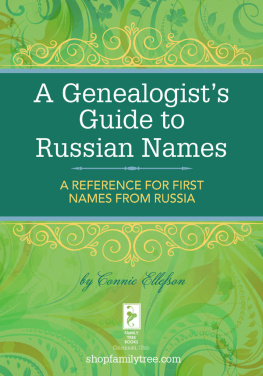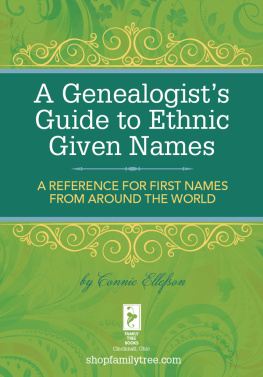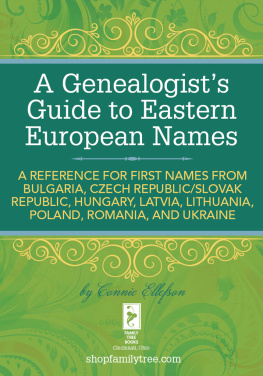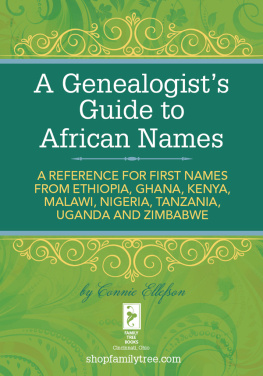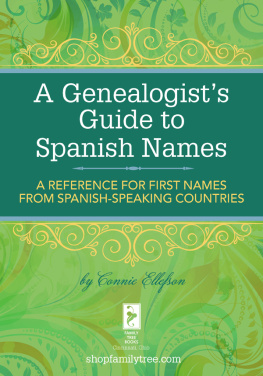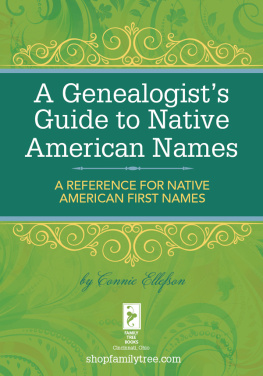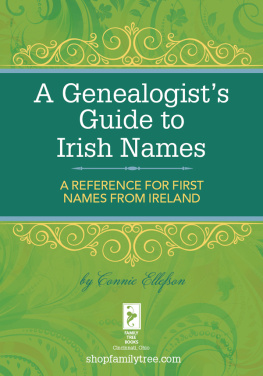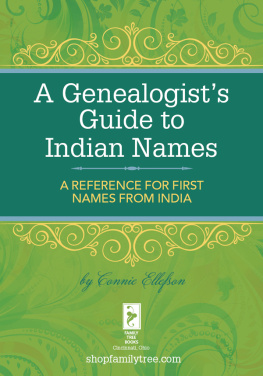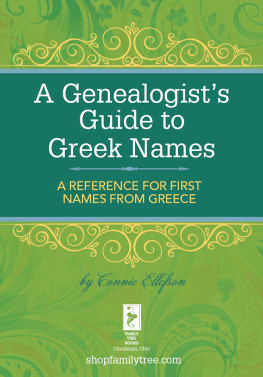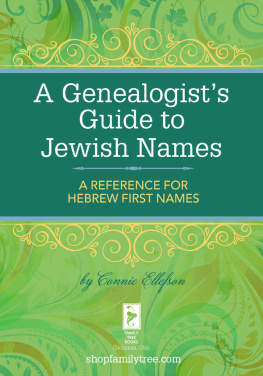A Genealogists Guide to Russian NamesA REFERENCE FOR FIRST NAMES FROM RUSSIAby Connie Ellefson Cincinnati, Ohio shopfamilytree.com
Russia
History
The first Russian immigrants to the U.S. established themselves as fur traders in the Aleutian Islands off Alaska in the 1740s. They gradually developed many trading posts in the mainland of Alaska, even venturing briefly as far south as San Francisco. In 1857, Russia sold Alaska to the U.S. for $7.2 million, but Congress took no interest in establishing a civilian government there. Lawlessness became rampant, and most of the Russian settlers returned to Russia.
Meanwhile, Russian peasants began immigrating to the U.S. in large numbers during the 1870s. Many were illiterate and desperately poor under the Russian czar. When the serfs had been freed in 1861, it was estimated that 85 percent of the population had been in bondage under that system. After receiving their freedom, they were often forced to support themselves on narrow strips of land from two to ten yards wide, which was owned by the community and could be redistributed routinely. Between 1871 and 1900, more than 750,000 people emigrated from Russia.
Over 50 percent of them ended up in New York and Pennsylvania, working in coal mines and textile mills. Their illiteracy and ignorance of the English language caused tremendous hardships because often they could apply for only the most backbreaking jobs, which were little or no improvement over their lot in Russia. Those who became farmers fared better, although language was still a barrier. They settled in the Western plains states, especially the Dakotas, Wisconsin, New York and Massachusetts. Between 1920 and 1940, more than two million people fled the Soviet regime in Russia. Many found homes in France, Germany and other east European countries, but about 30,000 immigrated to the U.S.
In 1969, a change in Soviet policy enabled over 200,000 to emigrate. Many were Jews who went to Israel, but there were 24,000 Soviet Jews in the U.S. by 1979. Over 75,000 Russians have immigrated to the U.S. since 1971. since 1820. since 1820.
Most of them were Jews; many were Poles, Ukraines and Lithuanians.
Naming Traditions
The most remarkable aspect about Russian names is the immense popularity of nicknames and diminutives. At birth, a child is given a formal name known as the passport name. Throughout childhood, and often adulthood, the child is called by an affectionate name derived from the formal name. The suffix -ka used to denote that the person was a serf. Today, it denotes extreme familiarity and is often used between children.
Parents are more reluctant to use these -ka nicknames, wishing to avoid the stigma of serfdom on their children. Instead, they might use these names for a pet. When a child is sixteen, the name known as the patronymic is bestowed. It denotes entry into adulthood and carries connotations of age and respect. The patronymic consists of the passport name plus the fathers first name taken as a middle name. For a boy, the suffix -ovich or -evich is added to the fathers name; for a girl, the suffix is evna or -ovna.
Thus, Piotrs daughter Natasha would become Natalia Petrovna, and his son Alyosha would become Alexii Petrovich. Within the family, the child may continue to be known by the nickname. Business colleagues would be more likely to use the patronymic.
Pronunciation
The pronunciation of Russian is much tighter than American English. The sounds are similar, but the mouth is not opened as wide. Note that the accent is often on the first syllable, which sometimes runs counter to an Americans attempt to pronounce it.
Thus, Pashenka is PAH-shen-ka, not pah-SHEN-ka. a = ah as in ball ei = eh as in late o = oh as in hope j = y as in yes ai = igh as in high ie, ii = ee as in keep u = oo as in moon
Russian Female Names
Agafia (Gr) good; Agafon
Agrafina (L) born feet first
Akilina (L) eagle
Alena (Gr) light
Alexandra (Gr) defender of mankind; Sasha, Sashenka, Shura, Shurochka
Alina bright, beautiful
Alia unknown meaning; Allochka
Alma name of river Amalija (Teut) industrious
Anastassia (Gr) Resurrection; Tasya, Tasenka, Stasya, Nastya
Anna (H) grace; Anya, Anechka, Asya
Antonina (L) inestimable; Tonya, Tonechka
Asenka (H) graceful
Bruna (Teut) dark haired
Dasha (Gr) gift of God
Devora (H) bee; Debora
Dina nickname for Dinah (H) judged
Dominika (L) born on Sunday, belonging to the Lord; Mika
Doroteya (Gr) Gods gift; Dosya, Dasha
Duscha (DOOSH-hah) soul, term of endearment
Ekaterina (Gr) pure; Katya, Katyenka, Katyuska
Elena (Gr) pure; Lena, Lenochka
Elizaveta (H) consecrated to God; Liza
Eva (H) life
Evelina (H) life
Evgenia (yv-jeen-yah) (Gr) well born; Zenya, Zenechka (ZHEHN-ech-ka)
Feodora (Gr) gift of God
Galina (H) God has redeemed; Galya, Galochka, Galenka
Ilia (H) God is the Lord
Inessa (Gr) gentle, pure
Irina (Gr) peace; Ira (EE-rah)
Irisa (Gr) rainbow
Ivana (H) Gods gracious gift
Karolina (Fr) petite, feminine
Katerina (Gr) pure; Ekaterina, Katya, Katinka, Kiska, Katuscha
Kira (L) light; Kirochka
Kisa pet name meaning kitty or pussycat
Kiska nickname for Katerina
Kostya pet form of Konstantin (Gr) constant; Kostenka, Kotik, Kostyusha
Lada mythological goddess of beauty
Lara (L) famous
Larisa (L) cheerful; Lara, Larochka
Lenora (Gr) light
Lenusya pet form of Yelena; lily flower; Liolya
Lida (Gr) happy; Lidiya, Lidochka
Liza diminutive of Elizabeth (H) consecrated to God; Lizette, Lisil, Lisilka
Lubmila loving
Lyudmila peoples love; Lyuba, Lyubochka, Lyubonka, Luda, Mila, Milena
Manya diminutive of Mara
Mara (H) bitter; Marya, Masha, Marusya, Manechka, Mashenka, Mura
Margarete (Gr) a pearl; Margo, Margosha, Rita
Maria (H) bitter; Masha, Mashenka
Marianna (H) form of Mary; rebellious; Masha
Marina (L) sea-maid; Marinochka (mah-REE-nosh-ka)
Marisha pet form of Mara
Mavra (L) Moorish
Nadezhda (Slavic) hope; Nadya, Nadyenka, Nadyuiska
Nadia (NAH-dee-ah) hope; Nadiya, Nadya, Nadenka, Nadysha, Dusya
Narkissa (Gr) daffodil
Nastassia (Gr) resurrection
Natalia (Fr) born at Christmas; Natalya, Natasha, Natashenka, Tasha
Nessa pet form of Agnessa (Gr) gentle, pure; Nesha, Netia
Nika belonging to God; Domka, Mika
Nina (H) grace; Ninochka (NEE-nosh-ka)
Oksana (H) praise be to God; Ksana, Ksanochka, Oksanochka
Olena 
